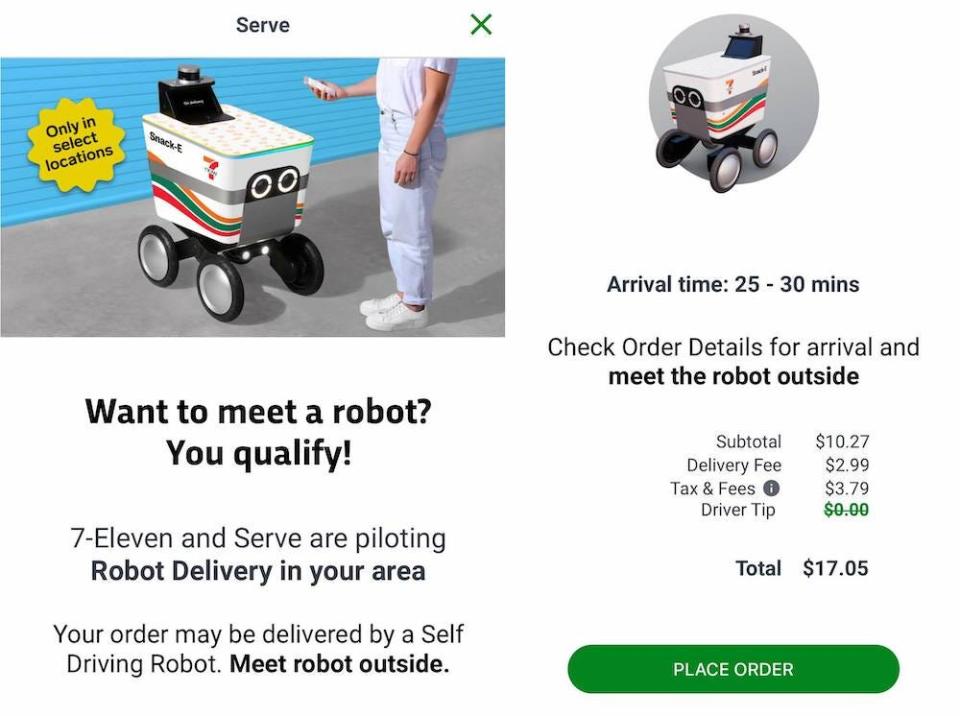7-Eleven is quietly testing self-driving robots to deliver Slurpees and Big Bite Hot Dogs in Los Angeles. Here's how it works.

7-Eleven is testing autonomous robot deliveries in the Los Angeles area.
The AI-powered robots are programmed to slow down on rough terrain to ensure spill-free Slurpees.
The convenience-store chain is using robots by Uber-backed Serve Robotics.
In West Hollywood, California, consumers don't have to fight local traffic when craving an ice-cold Slurpee.
All they have to do is hail a robot.
7-Eleven has been testing self-driving robots to deliver some of the convenience store chain's most iconic foods and snacks – from Slurpees to Big Bite Hot Dogs. The robots were first spotted by food tech writer Matt Newberg, who wrote about the robot delivery experience Thursday for HNGRY.
7-Eleven is partnering with food-tech startup, Serve Robotics, which is backed by Uber. 7-Eleven's venture arm, 7-Ventures, participated in Serve's $13 million seed round in 2021.
7-Eleven did not immediately reply to Insider's request for comment.
Serve Robotics confirmed the partnership, saying the robots have been "out there for some weeks."
The robotics firm plans to grow its fleet of robots nationally this year through partnerships with brands like 7-Eleven.
Uber Eats is testing Serve's robots in Los Angeles. The robot deliveries for 7-Eleven can only be made through the 7-Eleven delivery app, dubbed 7Now.

Insider tried ordering a delivery from a 7-Eleven on Santa Monica Boulevard in Los Angeles. At checkout, we were flagged about the robot test.
"Want to meet a robot? You qualify," the app asks."7-Eleven and Serve are piloting robot delivery in your area. Your order may be delivered by a self-driving robot. Meet robot outside."
The fee for a robot delivery is $2.99. The driver tip is automatically crossed out. By comparison, the fee for a delivery with a driver cost $2.99, with a recommended $3 tip.
Serve robots can carry about 50 pounds and are outfitted with cupholders, allowing 7-Eleven fans to order a variety of non-alcoholic beverages and snacks. The robots have nicknames – Snack-E and Nomsky.
The AI-powered robots are programmed to slow down on rough terrain to ensure the delivery of spill-free beverages like Big Gulps and Slurpees.
Consumers use a code to retrieve their orders from the robot.
"You never forget the first time you get your food from a robot. It is one of those defining moments in life like your first kiss," Serve Robotics CEO Ali Kashani told Insider.
Serve Robotics launched in 2017 as a division of Postmates and has been testing its autonomous delivery robots since 2018. Besides 7-Eleven, Walmart and Pizza Hut Canada have also tested Serve's robots. The robots are designed for short-distance deliveries, ranging from 1 to 3 miles. Most of Serve's robots can complete deliveries in about 15 minutes, the company previously told Insider.
In October, former DoorDash executive Prahar Shah was named Serve's first chief revenue officer. In an interview with Insider last year, Shah said he plans to target big chains – a playbook that resembles his growth strategy at DoorDash.
"Big, established players help give us the demand," he said. "They seed the market for us."
Read the original article on Business Insider

 money
money 